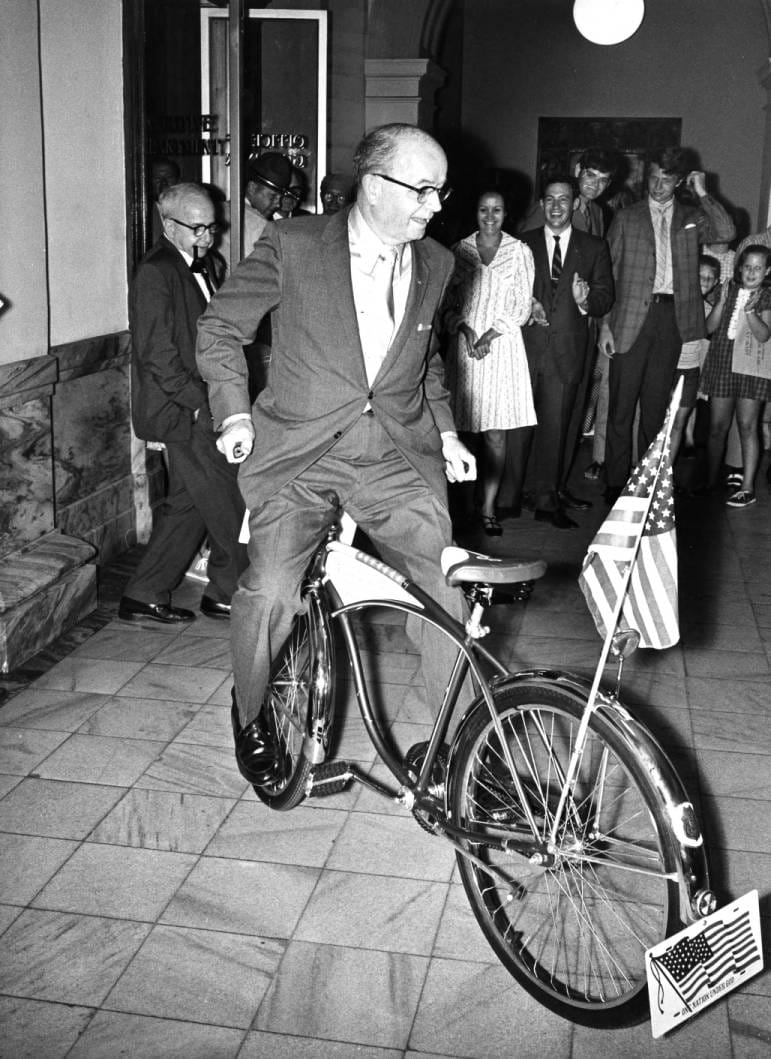By Bill Merritt
I grew up in Georgia during the Civil Rights era and have some experience with the way open primaries can go awry. One of the first ballots I ever cast was in the 1966 gubernatorial primary. Being Republican I, naturally, cast it in for Democrat Lester Maddox.
It wasn’t an open primary in the modern sense, but the outcome was the same. In Georgia at the time, governors were limited to a single term, which meant that every four years both parties would hold primaries to choose candidates. Except that, back then, Republican primaries didn’t mean anything because general elections didn’t mean anything; no Republican had been elected to a state office since Reconstruction. In 1966, two names were on the Democratic ballot. One was Lester Maddox.
Maddox was the former proprietor of the Pickrick Cafeteria, home of the Three-Legged Chicken — Maddox would have his cooks sew a third drumstick onto his chickens before cooking them. It was a family-friendly restaurant, with pickricks stored in nail kegs on either side of the large fireplace (Pickricks were what Maddox called ax handles).
When the civil rights movement kicked into gear, a group of demonstrators showed up at the door. Patrons grabbed pickricks from nail kegs and poured into the street to confront them, backed up by Maddox with a handgun. Federal lawyers got involved and, by the time it was all over, Lester Maddox had lost the most famous public-accommodations case in United States Supreme Court history and, rather than integrate, sold the restaurant to his employees. The employees were black.
Maddox became an instant martyr of the Segregationist Resistance, then ran for governor in the Democrat Primary in 1966. In ordinary circumstances, he wouldn’t have won; the liberal Atlanta press was against him, the old-line Democratic power elite was against him, and enough Democrats in general were becoming fed up with segregation and did not want anything to do with him. But circumstances in Georgia politics were anything but ordinary. That was the year the Republicans nominated Howard Calloway, and Calloway was a scary candidate to Democrats.
Calloway was young and vigorous, and he’d graduated from West Point — Southerners loved that kind of thing (we still do). Most importantly, he wasn’t Ellis Arnall, the other name on the ballot.
Arnall was the Jerry Brown of Georgia politics — an ancient, ineffectual retread who’d been governor six administrations earlier and was famous for adding something like ten-thousand trivial amendments to the state constitution, but not much else. Most Democrats weren’t going to go down and vote for the likes of Lester Maddox, so Ellis Arnall was going to be the candidate. And in Georgia in the 60s, that meant he’d be governor. Again.
He would have, too, except something like a hundred thousand Republicans showed up at the Democrat primary and pulled the lever for Maddox. That was the downside of keeping Republicans out of electoral politics: We all registered as Democrats. Otherwise, we wouldn’t have gotten to vote at all.
The plan worked, Maddox won the primary, and the establishment went ape-shit. There was no way that man was going to win a general election against Calloway. So in one of the great, cynical moves in the history of American politics (and there have been a lot of those), the liberal Atlanta press and the old-line political elite rallied together and began to tout Ellis Arnall as a write-in candidate. That way, the Democrats who would have sat home could vote their conscience, Arnall would get enough votes to deny Calloway an absolute majority, the election would be thrown into the Georgia House of Representatives (where every single member had been forced to take an oath of loyalty to the Democrat Party before being sworn in), Maddox would win, and the Democrats would get to keep the governor’s office without anybody ever having to say a kind word about Lester Maddox while they did it.
When Maddox moved into the governor’s mansion, the Atlanta papers took the high road and continued to campaign against the man they’d conspired to put into office. Among his other talents, Governor Maddox was a trick bicycle rider and, when a photographer caught him on New Year’s Eve 1969 sitting on the handlebars and pedaling with his feet, the headline accompanying the image was, “Governor Pedals Backwards into the Seventies.”
On another occasion he gave a speech supporting the fine arts, and somebody in the composing room swapped the N and the R and the headline had the Governor in Favor of Fire Ants. Or, maybe, it wasn’t somebody in the composing room. This switcheroo could have come all the way from the top, for all I know.
I’m in favor of trick bicycle riders, and Maddox didn’t turn out to be half as bad a governor as everybody expected. But, still, he was a remnant of a shameful segregationist past whom neither side wanted in office. To me, his election is an example of the things that go wrong in open primaries where parties are allowed to mess around in each other’s politics.
Bill Merritt left Georgia for the army and never returned. Today he lives in Portland, Oregon, is married, has lots of grandchildren and writes books, some of which get published by major houses.


